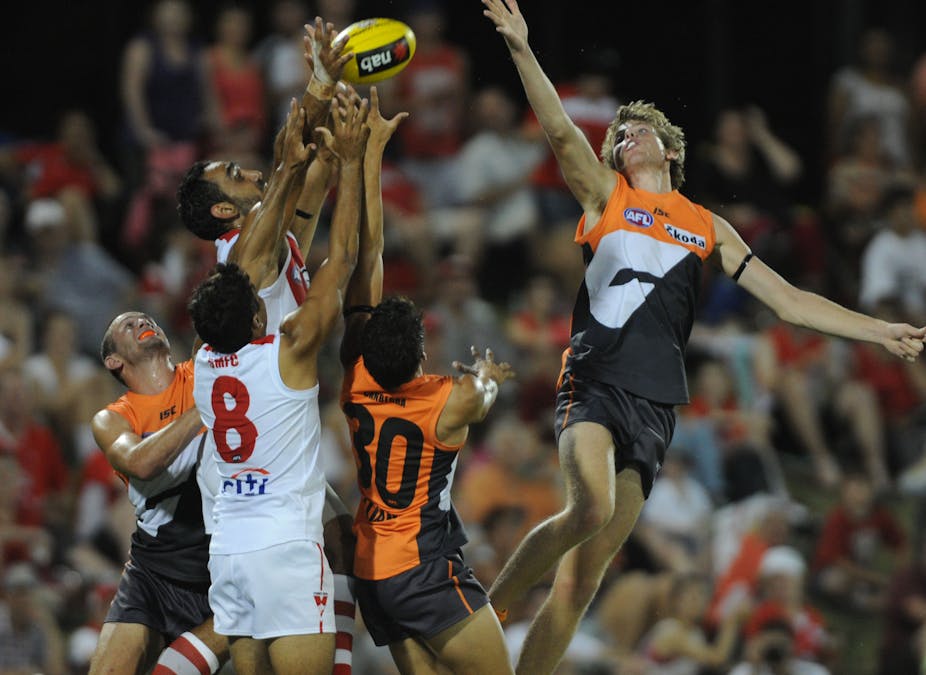The AFL season kicks off today and there’s a new team in town – Greater Western Sydney. Some don’t like it – the cynics claim Aussie Rules has no historical foothold in western Sydney.
I disagree.
While the game of Aussie Rules takes root in western Sydney this year, it will do so in the land of the family whose son created the game – Tom Wills. The game of Australian Rules football will, after 150 long years, return home.
Sporting snobbery
To dislike sport is forgivable, but not desirable. But to assume superiority of intellect because you dislike sport is neither forgivable nor desirable.
I say this because I am regularly asked to give talks about a book I wrote – Tom Wills. Most of you, no doubt, will have never heard of Tom Wills, but he is probably Australia’s most influential sportsman.
And that’s the problem.
As soon as I mention sport in these talks, half of the audience inwardly groan. Visions float before their sport-loathing eyes of the likes of Shane Warne. That is, until I start talking about Tom Wills. And to watch the transformation in “sport-haters” is one of my delights.
Tom Wills invented the game of Aussie Rules. His story and that of the game he created go to the heart of Australian history.
The man behind the game
Tom Wills was not from Melbourne. His family, sired by a convict, came from Sydney. This may rub with Melburnians but the truth is the game was created by a man who called himself “a Sydney man”.

His father, born in Sydney, was the editor of this country’s first-ever newspaper – The Sydney Gazette. His mother, a Parramatta girl, was orphaned young. Father and mother married in a small Anglican church in western Sydney.
Tom, their first child, was born just outside Canberra. When father, mother and young Tom moved to Victoria they lived with the local aboriginal people – the Djab wurrung. All of Tom’s playmates were aboriginal and it was here he learned their games and languages.
Tom Wills, as a boy, was sent to England and lived as a boarder at Rugby School for five years. When he returned to Melbourne, Tom was recognised as the finest cricketer in the colonies.
In 1858, Wills wrote that these colonies should have a football club. And so he created the Melbourne Football Club. Australian Rules football - our great and unique contribution to the culture of world sport - was launched.
Family tragedy
At the peak of his celebrity, Wills was plucked by his father from the adulation of Melbourne to settle a new family property in the Queensland outback. Tom, his father, and more than 20 other white settlers reached their destination. On the afternoon of 17 October 1861, local aboriginal people attacked the party and slaughtered 19 men, women and children. Tom survived; his father did not.
Five years later, Tom, still deeply affected by his father’s murder, was broken and drinking heavily. But he then undertook an act of unanticipated courage. Returning to Victoria, he gathered a team of aboriginal farm labourers and shaped them into a cricket team.
This white captain of a black team travelled to the Melbourne Cricket Ground on Boxing Day 1866 to play the Melbourne Cricket Club. The colony was agog. This was an act of great healing in Australian history. An act by a sportsman, not a prevaricating politician. This aboriginal cricket team became the first Australian cricket team to travel to England.
A new story
The significance of Tom’s formation of an aboriginal team came to mind not long ago when, on an icy July night, I attended a junior AFL coaching course in Sydney. Around me sat about 100 men and precisely two women.
The women, both teenagers, sat together tightly; a brace of Muslim women wearing hijabs. I thought the women brave for coaching an all-girl AFL team in western Sydney. But they were not excluded, just accepted.
And it is the power of this acceptance and of Wills’ legacy that proves how courageous sport can be in the story of Australia.
It’s time for Aussie Rules, born of this “Sydney” man’s inspiration, to return to the land of his family.

